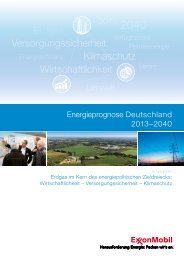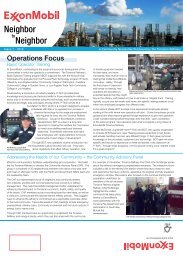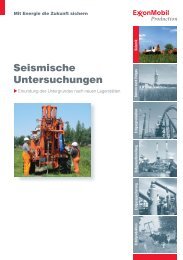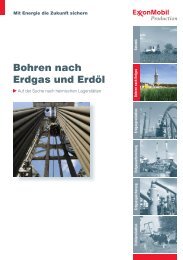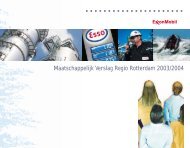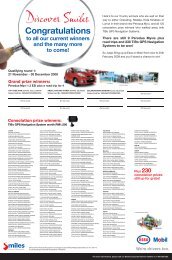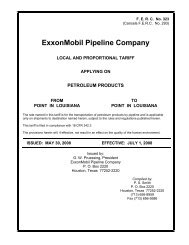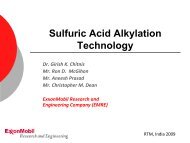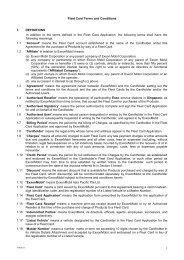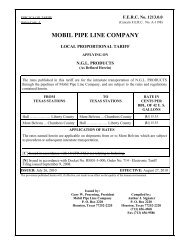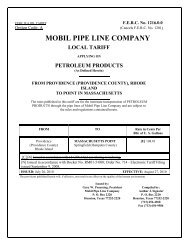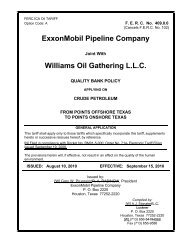The Lamp - ExxonMobil
The Lamp - ExxonMobil
The Lamp - ExxonMobil
You also want an ePaper? Increase the reach of your titles
YUMPU automatically turns print PDFs into web optimized ePapers that Google loves.
Tom Upton, global manager, product<br />
research, studies a polymer sample in<br />
his Baytown, Texas, laboratory.<br />
<strong>ExxonMobil</strong> Chemical’s new<br />
Enable Mpe products are recyclable<br />
and help make strong but<br />
significantly thinner films that<br />
use fewer raw materials and<br />
less energy than conventional<br />
films. Energy efficiencies are<br />
seen across the entire life cycle,<br />
from manufacturing, to product<br />
transportation, to prolonged<br />
shelf life and finally to recycle<br />
and disposal.<br />
“<strong>The</strong>se new products reduce<br />
the amount of film needed by<br />
about 20 percent, improve film<br />
performance and, at the same<br />
time, reduce energy consumption<br />
because they can be processed<br />
at lower temperatures,”<br />
says Margaret Mattix, global<br />
marketing vice president. “In<br />
fact, these products can have<br />
significant greenhouse-gas<br />
reductions, equivalent to sav-<br />
25<br />
ing enough energy to power<br />
900,000 homes.”<br />
<strong>ExxonMobil</strong> products are also<br />
used to keep people warm.<br />
Many believe that cotton is a<br />
better choice for fabric because<br />
it’s a natural fiber and renewable;<br />
however, cotton requires large<br />
amounts of water compared to<br />
other crops such as rice, wheat<br />
and corn. Cotton’s supply growth<br />
will be challenged by competition<br />
for land and water as world population<br />
increases and economies<br />
continue to develop.<br />
Polyester production uses<br />
only about 0.1 percent of the<br />
water used to grow cotton. Not<br />
only is it more sustainable, but<br />
it is preferred by the consumer.<br />
“Polyester has become a popular<br />
choice over cotton because<br />
of its lower cost and superior<br />
performance,” says T.J. Wojnar,<br />
senior vice president for Basic<br />
Chemicals, Intermediates and<br />
Synthetics. “<strong>The</strong> developing<br />
world – notably China, where<br />
demand for consumer goods<br />
is growing – has shown a clear<br />
preference for clothing made<br />
from polyester, thanks to its lower<br />
cost and wide range of product<br />
choices.”<br />
<strong>ExxonMobil</strong> Chemical has<br />
recently developed a proprietary<br />
catalyst to improve the<br />
overall manufacturing process<br />
for polyester, making it more<br />
efficient and cost effective. <strong>The</strong><br />
innovation, now being licensed<br />
by <strong>ExxonMobil</strong> under the name<br />
PxMax, significantly lowers the<br />
cost of producing xylene, the<br />
primary ingredient to manufacture<br />
polyester. <strong>The</strong> process<br />
also generates less waste and<br />
requires less energy than previ-<br />
ous methods, which, in turn,<br />
lowers CO 2 emissions from the<br />
eight <strong>ExxonMobil</strong> and licensee<br />
plants where PxMax technology<br />
is being used.<br />
From the auto world<br />
One of the company’s most<br />
exciting new technologies is in<br />
the design of the battery separator<br />
film within lithium-ion batteries<br />
for hybrid and electric vehicles.<br />
“<strong>The</strong> challenge given to us by our<br />
customers was clear – enhance<br />
battery performance by improving<br />
safety, reliability and power<br />
density,” says Jim Harris, senior<br />
vice president of Polymers. “We<br />
responded with an innovative<br />
polymer film that combines our<br />
advanced manufacturing process<br />
with our proprietary polymer<br />
technology.” Powering hybrid and<br />
electric vehicles with lithium-ion




